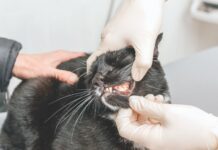Question: I bought a sweet, purebred kitten from a breeder. The kitten seemed healthy at first, but he soon became ill. He had feline infectious peritonitis (FIP) and died several weeks later. The breeder offered to replace the kitten, but Im afraid the new one might get sick, too. I want another kitten of the same breed, but I dont want to go through the heartache again. A friend told me that I should have had the kitten tested for FIP, and should have bought him only if he tested negative. Is this true? Should I buy from a different breeder? If so, should I make sure that the breeder has never had any cats with FIP?
Answer: The answers to your questions are rather complicated. It might be easier for me to answer them if I state a few facts. First, a positive FIP test result merely indicates exposure to coronavirus. Coronaviruses are present in virtually every multiple-cat environment, including catteries; a high percentage of cats from such environments will have positive FIP test results. Most (about 95 percent) positive-testing cats will not get FIP. The disease is considered a rare consequence of a coronavirus infection. A sad fact is that FIP test results vary tremendously from laboratory to laboratory. (Not only do the numbers vary, but one labs positive test may be another labs negative and vice versa.)
This said, should you insist on purchasing only a negative-testing kitten?
Theoretically, its a sound idea – assuming the test used is accurate and the result is interpreted correctly – since a cat never exposed to coronavirus would not be at risk of developing FIP. However, coronaviruses are present in most catteries – even the most well-managed ones – so it may be very difficult to find an unexposed kitten.
It is practically impossible for breeders to eliminate coronaviruses from their catteries, so having positive-testing cats – even ones that have experienced FIP – should not be an automatic condemnation. It is more important that the cattery be clean, pleasant-smelling and not overcrowded. The cats in the facility should be healthy and sociable, and you should feel comfortable with the breeder and his or her desire to work with you in finding a kitten you like. I would not automatically decide against purchasing a cat from a particular breeder merely because he or she has cats that tested positive – or has lost cats because of – FIP.
———-
Question: Two years ago, I took in a black-and-white kitten, Patches. She loves to play and gets along with our other cats, both of whom are about five years old. But she is afraid of everybody! She runs and hides when anyone comes to the door. She even runs away from my wife, although she will take table foods from her hand. If Im alone, Patches comes to me every night for rubbing and scratching, but she wont let me pick her up. Is this a result of her first three months being spent in the wild, the offspring of feral parents? Can we do anything to gain her trust and confidence?
Answer: Patches early experiences – or lack thereof – had a profound influence on her behavior. Early life experience and genetic makeup are both believed to determine how friendly a cat is to people. Researchers have found that friendliness is, in part, learned from the mother cat: If kittens observe their mothers pleasantly interacting with humans, they are much more likely to grow up to be friendly. Also, friendly fathers tend to sire friendly kittens.
Kittens also require early positive social experiences with people to provide the best assurance that they will be friendly to people when they grow up. Kittens are most easily socialized from about two to seven weeks of age, after they are able to see, hear and freely move about. Kittens of this age that are handled by humans are much more likely to grow up to be friendly to people than kittens that are not handled. (Interestingly, kittens handled by only one person during this sensitive period tend to just be friendly with the one person. But kittens that have contact with more people tend to become adult cats that are friendly with everyone.)
Cats that have missed the opportunity for handling by humans during the sensitive period of socialization can sometimes be socialized, but the process requires much patience and time.



